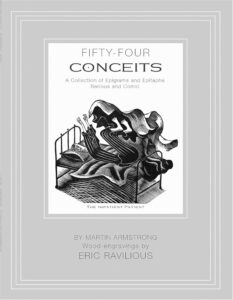
A serious poet and writer, Martin Armstrong could also have fun.
I was looking through the poetry section at a bookstore. I noticed a small volume with the engaging title of Fifty-Four Conceits by Martin Armstrong. Extracting it from its shelf, I saw the full title – Fifty-Four Conceits: A Collection of Epigrams and Epitaphs Serious and Comic. This sounds weird, but I wondered how long this little book had been waiting for someone to buy it. Being something of a sucker for epigrams, I could say its wait was over. It joined several others I was holding in my hand, found itself scanned and placed in a bag, and was soon out the door.
I’d never heard of Armstrong (1882-1974). So, I turned to Dr. Google. A graduate of Cambridge, Armstrong served in the British Army in World War I and was best known as a writer of stories and novels. He was also a poet, officially listed in the 1922 (and final) anthology edition of Georgian Poetry. He married Canadian writer Jessie McDonald, the ex-wife of the American poet and writer Conrad Aiken. (Aiken included Armstrong in his 1952 autobiographical “narrative” Ushant but under a disguised name.)

Martin Armstrong
Armstrong’s most prolific writing period was the 1930s and included poetry, short stories, essays, novels, translations, and biographies. His writing output fell precipitously after that, with very few works published from 1940 until his death in 1974.
Fifty-Four Conceits was originally published in 1933; you can find a used first edition online for between $800 and $900. My little reprint was published in 2018, but it doesn’t look shelf-worn, so I can’t say how long it’s been waiting for purchase. It includes the original 1933 woodcuts accompanying the text and drawn by Eric Ravilious, a British painter, book illustrator, and wood-engraver.
Ravilious (1903-1942) has his own story. A successful artist, he offered his services to the British Admiralty at the start of World War II in 1939. He painted warships, barrage balloons, bomb disposal experts, submarine interiors, and sea battles. On a mission to find a downed aircraft based in Iceland, Ravilious chose to join one of the search planes, but it, too, never returned to base; his body and those of the plane’s crew were never found.
Armstrong’s epigrams and epitaphs have largely retained their meanings for contemporary readers. The first of the 54 in the collection was the one that caught my eye:
A Judge
Many by me, their Judge, when I had breath,
Were to confinement sent to wait their death:
Now breathless I, without the strength to budge,
Lie here confined by Death to wait my Judge.
All of the epitaphs and epigrams have that same wry humor, whether they describe a chemist, an airman, an athlete, a soprano, St. Mary of Egypt, and other people or types of people. One epitaph might even seem to anticipate the death of his illustrator Ravilious nine years later.

Blown from our course far westward of the Horn
Beneath the Southern Cross we rolled forlorn
Till mastless, rudderless, upon our knees
We found our homeless haven in midseas.
And I had to laugh when I came across this epigram near the end of the volume:
Reviewers
People with a turn for spite
Write about what others write,
And their still more spiteful brothers
Write on those who write on others.
Lord who rulest sea and land
Save us from the secondhand.
Fifty-Four Conceits is a small, slender volume, but for me it opened a door on a poet and an illustrator I’d never heard of, and a time when poets and artists created in peace and served in war.
Photo by Tambako the Jaguar, Creative Commons, via Flickr. Post by Glynn Young.
How to Read a Poem uses images like the mouse, the hive, the switch (from the Billy Collins poem)—to guide readers into new ways of understanding poems. Anthology included.
“I require all our incoming poetry students—in the MFA I direct—to buy and read this book.”
—Jeanetta Calhoun Mish
- Longfellow’s “Paul Revere’s Ride”: Creating a National Legend - April 17, 2025
- Poets and Poems: Katie Kalisz and “Flu Season” - April 15, 2025
- Poets and Poems: Michelle Ortega and “When You Ask Me, Why Paris?” - April 10, 2025


Leave a Reply